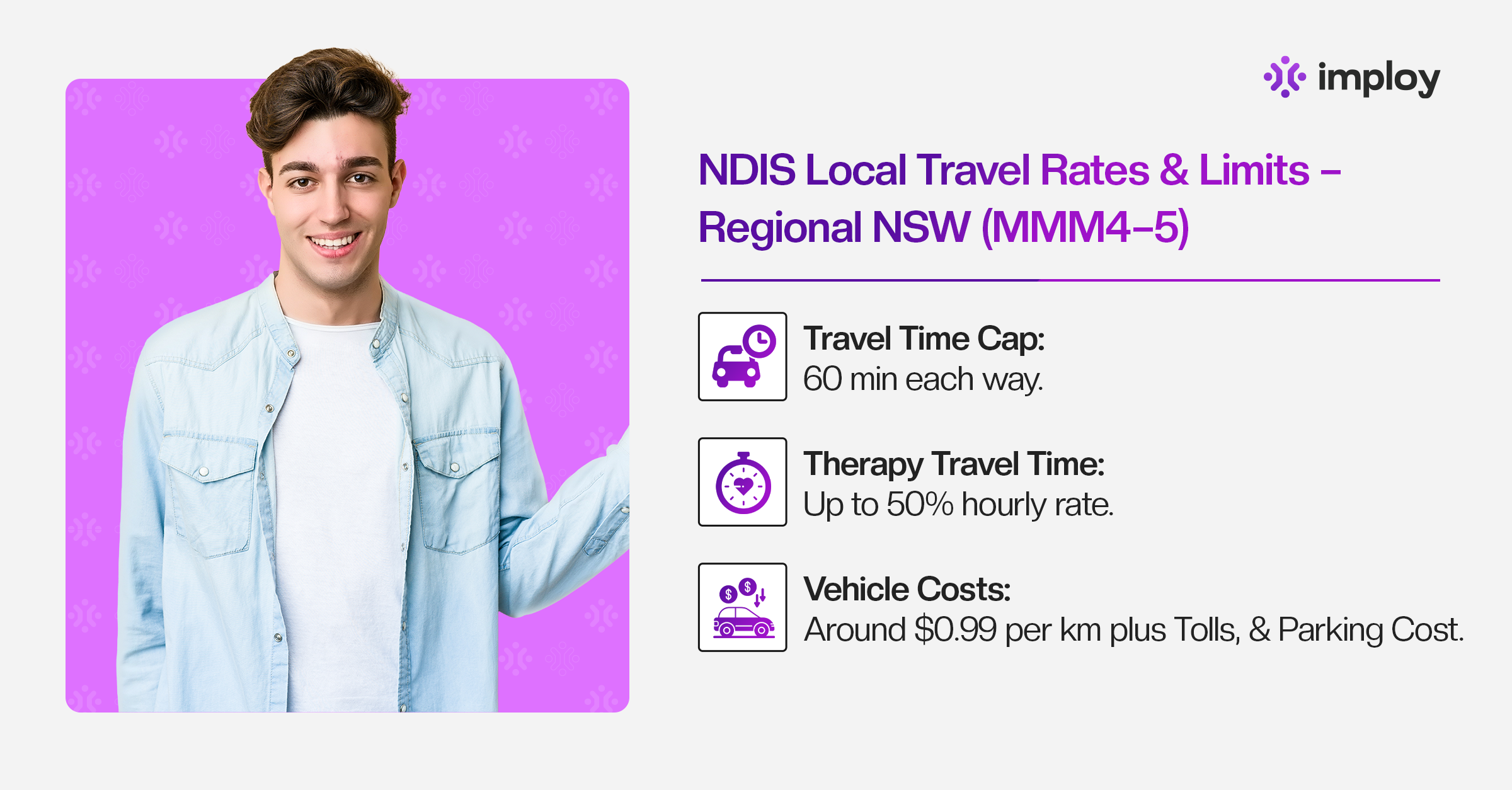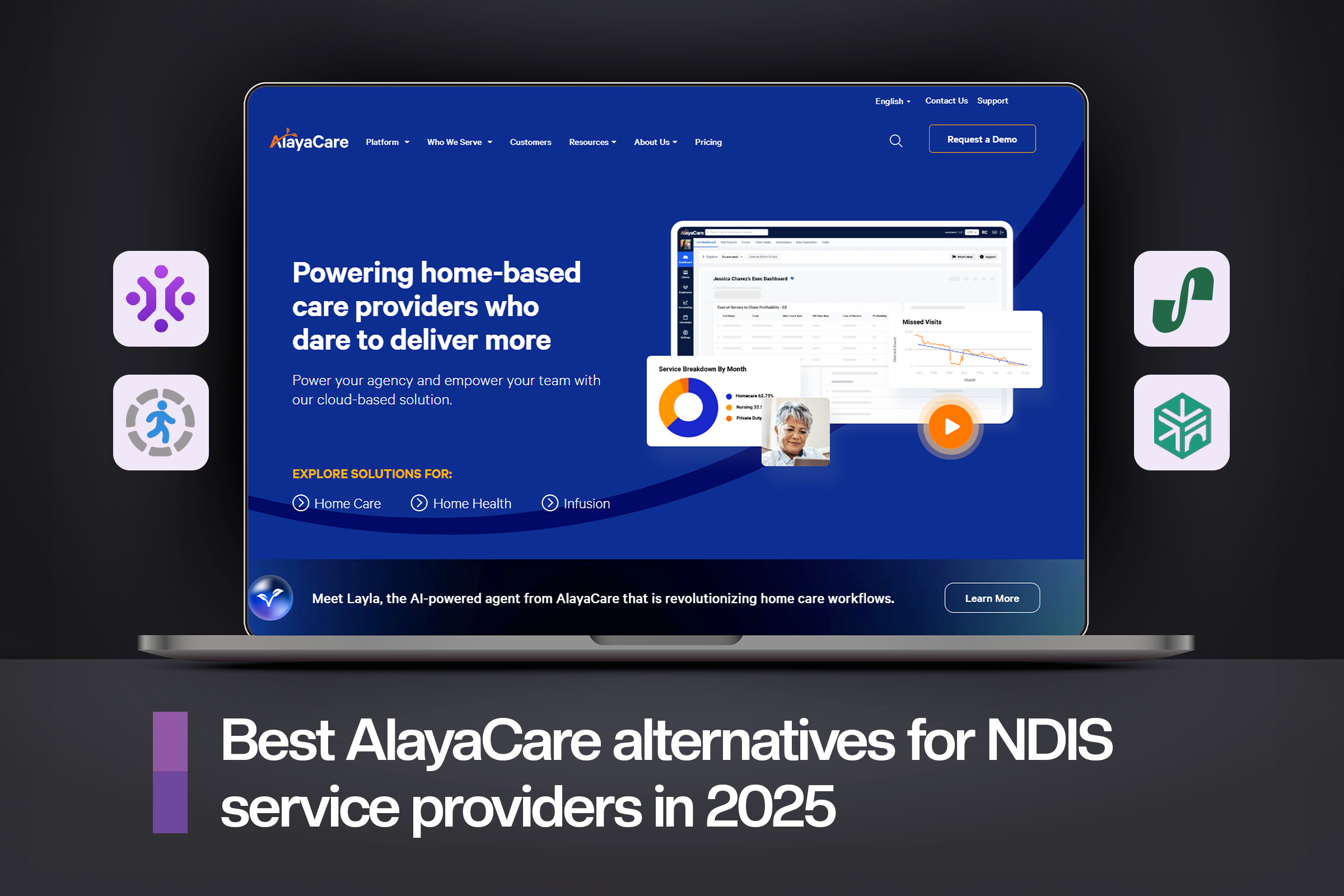NDIS Local Travel Reimbursement Rate for Support Workers in Regional NSW
Stay updated with the 2025-26 NDIS travel reimbursement rules for support workers in regional NSW. Learn the latest PAPL rates, travel time caps, and how imploy helps providers stay compliant and paid fairly.

Support workers under the National Disability Insurance Scheme (NDIS) often travel significant distances to visit participants, particularly in regional New South Wales (NSW). Travel adds costs: fuel, vehicle wear, time, and opportunity cost. Clear understanding of the current rules, rates, entitlements, and how to claim travel properly is essential for fair payment, legal compliance, and smooth operations.
This detailed guide walks you through what’s changed in the NDIS Pricing Arrangements & Price Limits (PAPL) for 2025-26, what support workers in regional areas should know, and how to ensure travel is reimbursed correctly.
What the 2025-26 NDIS Pricing Arrangements & Price Limits (PAPL) say?
The NDIA’s PAPL document, effective from 1 July 2025, governs how much registered NDIS providers can charge participants or plans for support, including travel.
Key points:
- Price limits are maximums, not mandatory amounts. Providers and participants can agree to lower rates, but never exceed the limits.
- The PAPL classifies locations using the Modified Monash Model (MMM), which designates areas by remoteness and population (MMM1: major cities, MMM4-5: regional, etc.). Travel time caps depend on MMM classification.
- From 1 July 2025, there are changed rules especially for therapy providers about how they can claim travel time.
In short, the 2025-26 PAPL ensures fair and transparent pricing across Australia, recognising the extra time and costs involved in reaching participants - especially in regional and remote areas. By setting clear limits and consistent rules, the NDIA aims to balance affordability for participants with fair compensation for support workers and providers delivering essential NDIS services.
What has changed for travel-related billing? (2025-26)
With the release of the 2025–26 NDIS Pricing Arrangements and Price Limits (PAPL), the NDIA has refined how providers can claim travel time and costs. These updates aim to create more consistency across service types while ensuring participants aren’t overcharged for travel, particularly in therapy services.
- Therapy provider travel time cap reduced:
Therapy providers can now claim labour time for travelling only up to 50% of the relevant support's hourly price limit. That is, instead of billing full hourly rate for travel time, for therapy supports the travel time component is limited to half of the support’s price limit. - Time caps for travel remain by MMM classification:
- MMM1-3 (major cities / metro areas): 30 minutes each way travel time cap.
- MMM4-5 (regional areas): 60 minutes each way.
- Remote (MMM6) and very remote (MMM7): different loadings; in many cases time caps do not apply the same way.
- Non-labour travel costs remain claimable:
These include vehicle running costs (fuel, maintenance), tolls, parking, etc. These are non-labour/non-time costs (often called “provider travel - non-labour costs”). These are not subject to the 50% travel-time cap that applies to therapy providers. They are still claimable in addition to time charges, provided properly agreed and documented. - No change for non-therapy (disability support) provider travel time:
The 50% cap applies only to therapy support. Disability support workers (DSWs) and other non-therapy support types do not operate under that 50% cap for travel time. Their travel time is still governed by the older rules (i.e. full hourly rate, subject to the time caps for their MMM region).
These updates mark a key shift in how therapy travel is billed - promoting fairness, transparency, and alignment with the broader NDIS goal of sustainability. Providers should review their service agreements and update billing practices accordingly to stay compliant from 1 July 2025.
What are the travel rates & limits for regional NSW? (MMM4-5)
For support workers operating in regional NSW, which typically falls under MMM4-5, here are the relevant travel entitlements under the 2025-26 PAPL:
Note: The PAPL does not explicitly fix $0.99/km in all instances, but that figure is used in provider-based discussion and guidance for non-labour travel. If your service agreement with a participant or provider states a different rate (within reasonable limits), that may be used.
For a detailed breakdown of current travel time limits, kilometre rates, and claiming rules for different regions, check out imploy’s guide on the NDIS Travel Allowance for Support Workers.
How to calculate travel reimbursement? (detailed worked examples)
Here are scenarios showing how to calculate both time and non-labour travel components under the 2025-26 rules in regional NSW.
Example A: Disability Support Worker visit (non-therapy support)
Scenario:
- You are a disability support worker (non-therapy role).
- You travel to a participant’s home in a regional area (MMM4-5).
- Distance: 30 km round trip (15 km each way).
- Your agreed hourly rate for face-to-face support: $45/hour.
- You spend 45 minutes travelling one-way to reach the participant, and 45 minutes returning after the visit. (Total travel time: 1.5 hours).
- You also use your own vehicle, agreed with the participant, and the non-labour travel cost rate is $0.99/km.
Calculations:
- Travel time (labour): Since you are a non-therapy support worker, you can charge full wage rate for travel time (if agreed), subject to the cap of 60 minutes each way in your region. Here, 45 minutes each way is within the 60-minute cap. So you can claim 1.5 hours × $45/hr = $67.50
- Non-labour cost (km): 30 km × $0.99/km = $29.70
- Total travel reimbursement: $67.50 (time) + $29.70 (vehicle & fuel) = $97.20
Example B: Therapy provider travel (therapy support role)
Scenario:
- You are an occupational therapist delivering therapy under an NDIS plan.
- Your therapy face-to-face support item is priced at $190/hour (price limit).
- Location: MMM5 (regional). Travel time each way: 45 minutes (so total 1.5 hours travel time).
- You also use your car, an agreed non-labour travel cost at $0.99/km. Round trip: 40 km.
Calculations:
- Travel time (labour): Because you are a therapy provider, travel time is capped at 50% of the therapy support item hourly price limit. So 50% × $190 = $95/hr for travel time.
- You have 45 minutes each way; since 45 < 60 (the cap for MMM4-5), you can use actual travel time. So total travel time = 1.5 hours × $95 = $142.50
- Non-labour travel cost (vehicle etc.): 40 km × $0.99/km = $39.60
- Total travel reimbursement: $142.50 + $39.60 = $182.10.
What you need to ensure in your service agreement & invoicing?
It’s crucial to get things set up properly so there are no disputes and so the claims comply with NDIS rules.
- Service Agreement
- Must spell out whether travel time is charged (labour) and at what rate (full or half for therapy) and whether non-labour costs will be included (vehicle km, tolls, parking).
- Must reference the participant’s MMM classification (so both parties understand the time-cap limit).
- Must state how travel between multiple participants (if relevant) will be handled (apportionment of travel time or km).
- Documentation & record-keeping
- Keep accurate travel logs: date, departure point, destination, arrival, return, kilometres, times.
- Keep receipts for fuel, tolls, parking.
- Where travel covers more than one participant: have written agreement about how travel time/kilometres are split.
- Itemised invoices
- Show separate line items for: (a) face-to-face support time; (b) travel time; (c) non-labour travel costs (km etc.).
- For therapy providers: clearly label travel time and show that rate used is no more than 50% of the therapy item’s price limit.
- Stay updated
- The NDIA publishes updates; PAPL may have addenda or adjustments during the year.
- Make sure you use the latest version (for example, any changes from 24 November 2025 are applied from that date).
Common questions & myth-busting
With so many updates in the 2025–26 NDIS Pricing Arrangements, it’s easy for providers and workers to feel unsure about what can and can’t be claimed for travel. Below are some of the most common questions - and the facts that clear up frequent misconceptions about NDIS travel reimbursements.
How imploy helps to make travel claims easier?
imploy isn’t just a rostering or payroll tool - it’s built to ease the full administrative burden around delivering supports under the NDIS, including managing travel reimbursement. Here’s what it does:
- Real-time travel time & kilometre logging: Support workers can record when they leave, arrive, log kilometres driven, capture expenses (fuel, parking, tolls) right from the app. This ensures both labour and non-labour travel costs are accurately captured.
- Templates & rate enforcement: With imploy you can configure your rates so that therapy providers automatically use the 50% hourly cap for their travel time, and that non-therapy providers continue with full rate, without manual recalculation each time. Also, travel time caps (e.g. 60 min each way for regional areas) can be embedded in scheduling invoicing logic.
- Integrated invoicing and payroll: No more double-entry or manual summing of travel time, kilometres, and expenses. Invoices and payroll can pull directly from log data, reducing errors, saving time, and ensuring compliance with PAPL rules.
- Transparency & compliance built-in: All travel, shift schedules, and client agreements are visible in the system. Staff can see what they’ll be paid, managers can review travel claims, compliance reports can be generated in case of audits.
- Administrative efficiency, especially important in regional settings: Because distances are greater and travel is more frequent in regional NSW, the time savings from having accurate, automatic tracking matter more. imploy helps cut down on manual paperwork, delays in claims, and potential unpaid or underpaid travel.
Final Thoughts
The 2025-26 NDIS Pricing Arrangements and Price Limits (PAPL) bring important updates to how providers can claim travel time and costs - especially for therapy services and those operating in regional NSW (MMM4–5).
Understanding the difference between labour (time) and non-labour (vehicle) travel costs is key to staying compliant. The reduced 50% cap for therapy travel time and clear MMM-based time limits help ensure fairness across the sector, balancing participant affordability with fair pay for providers.
For support workers and organisations in regional areas, tools like imploy make it easier to stay on top of these changes. With built-in kilometre tracking, automated rate settings, and integrated invoicing, Imploy helps providers manage travel claims accurately and transparently - so workers get paid fairly, and participants get the quality care they deserve.
FAQs
1. What is the current per-kilometre reimbursement rate under NDIS?
The NDIS doesn’t set a single fixed per-kilometre rate for all providers. However, many use around $0.99 per km as a reasonable benchmark for standard provider-owned vehicles. The agreed rate must be reasonable, included in the service agreement, and supported by records.
2. Can I claim both travel time and kilometres?
Yes, if both are agreed in advance and properly documented. You can claim labour time (the time you spend travelling) and non-labour costs (vehicle expenses like fuel, tolls, or parking). For therapy supports, the travel time must be billed at up to 50% of the hourly rate.
3. What’s the travel time cap for regional NSW?
In regional NSW (MMM4–5), providers can claim up to 60 minutes each way for travel time - both for therapy and non-therapy supports. Anything beyond that usually isn’t claimable unless specific exceptions apply (for example, in remote or very remote areas).
4. Does the 50% travel cap apply to Disability Support Workers (DSWs)?
No. The 50% travel-time limit applies only to therapy providers (e.g., physios, OTs, speech therapists). Disability support workers can still claim travel time at their full hourly rate, subject to MMM travel time caps.
5. How can imploy help with NDIS travel compliance?
imploy simplifies compliance by:
- Allowing workers to log kilometres and travel time in real time.
- Automatically applying travel rate rules (like the 50% therapy cap).
- Generating accurate invoices and payroll entries.
- Maintaining a full audit trail for NDIS reporting.
This ensures fair pay for workers and transparency for providers and participants alike.





